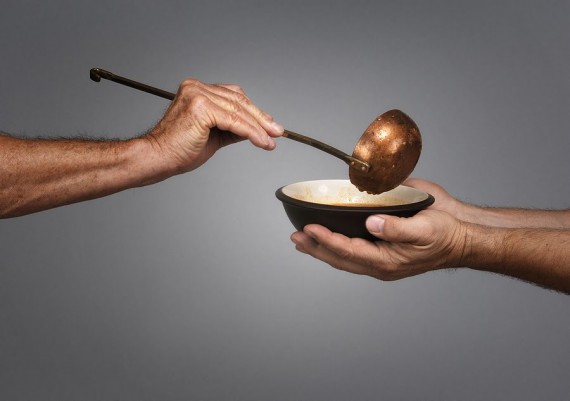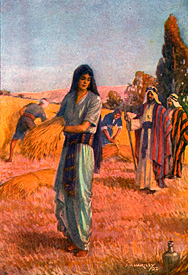I’m not poor. In fact, Sam, who writes at GraceGround, recently directed me to a Photo Essay called “Where Children Sleep,” which showed me how unbelievably rich I really am.
A huge question in my life right now is how I can “share the wealth” with those who have less than I.

I know this is a huge political issue right now as many on the political left are saying that it is the responsibility of the rich to “spread the wealth around and give their fair share” while those on the right are saying, “Stay out of my pocket so I can create jobs.”
This is not a political blog, and I do not have a solution. But one thing I do think is that it should never be the government’s responsibility to provide for the poor and hungry. This is the church’s responsibility. And somewhere along the way, the government decided to get involved, and the church was only too happy to let them, because this freed up more money for big buildings, and better salaries.
Ok. I’m getting cynical again. Let me back up and start over…
I’m not poor. I think one of the things God calls us to do as followers of Jesus is help provide for those who are poor and hungry. And the world is full of people who need our help.
But the question is “How”?
Is a free handout from the church or the government the best way to help? I tend to think not.
 In ancient Hebrew culture, the Mosaic Law instructed the Israelites that one way to provide for the poor and needy in their community during harvest time was to leave the corners of their field unharvested. Then those who were hungry could go to the field, and harvest this grain for themselves.
In ancient Hebrew culture, the Mosaic Law instructed the Israelites that one way to provide for the poor and needy in their community during harvest time was to leave the corners of their field unharvested. Then those who were hungry could go to the field, and harvest this grain for themselves.
The law did not require that the landowner harvest all the grain, and then to provide for the poor, take a portion of the harvest, thresh it, grind it, make bread out of it, and deliver it to the poor. Instead, land owners were expected to leave a portion of their fields unharvested so the poor and hungry could provide for themselves. The food was there for people who needed it, if they went out to collect it, thresh it, mill it, knead it, and bake it.
In other words, the food was there, but it wasn’t going to just appear on your doorstep while you sat home and watched TV.
Is that too harsh?
I just see all the needs around us, and our country spiraling into debt, and I wonder if there isn’t a better, more efficient way of taking care of the people in our country and especially those around the world, who are without daily food and clothes. But meeting needs is not the same thing as giving handouts. Instead, in exchange for society meeting the personal needs of food, clothing, and lodging, people should be expected to contribute in some way or fashion to meet various societal needs.
I am not a politician, nor am I an economist, so I certainly don’t have all the answers, but I wonder if there is anything the church and our national welfare system could learn from the example in Scripture and how God wanted the Israelites to provide for those with needs in their country.
What do you think?




Neither politicians nor churches seem to be able to come to a consensus on this issue. It does seem that to develop a long term sustainable system that returning some services for goods and money given to meet basic needs should work. But there seem to be so many problems trying to put such a system into practice.
On a personal basis, my wife and I have decided that we must be willing to give expecting nothing in return. (Otherwise we would be disappointed most of the time.) Our biggest problems are trying to make sure that what we give actually gets to the people most in need (and not the “middlemen”), and trying to figure out who is genuinely needy. Curiously, the ones most in need usually are the least demanding and the most likely to say “Thank You”.
Very good point about those most in need are the least demanding and most likely to say thank you. Very true.
I agree that there are no good solutions on a large scale. But I like your decision that whatever churches and politicians do, you can make your own choices the best of your ability with your own money and resources. That is the way forward!
After years of working with the homeless and drug addicts, I’ve unfortunately discovered that a large percentage rarely appreciated they got something for nothing. (Teen Challenge was a year long with free food, clothing and housing), it was completely paid for by donations. (And not many people want to donate to a bunch of addicts). I vividly recall one time when we brought them out to feed the homeless one weekend. The people we helped complained that the food was no longer hot, or they didn’t get enough napkins, or they felt ripped off because we just made them burgers with no cheese! Some said thank you but the vast majority were discontent. This wasn’t new, but maybe it finally got to me. After leaving Teen Challenge,I’ve constantly wondered how to help those in humble circumstances who lacked humility. While there are some homeless people, the vast majority are just hobos. I realized the TRULY homeless would be too embarrassed to go to the staged events we held. I know this is my “emotions” talking, but I feel sometimes Christians are better off teaching them *how* to get food while we are feeding the one ones who don’t have an entitlement attitude. That’s just my humble opinion. 🙂
Anthony,
Thanks for sharing your experience. It has been mine too. I don’t know what the solution is either, or how to get the resources to the people who are truly in need.
I wonder sometimes if there are very few in the US “truly” in need. Those truly in need may be in other countries.
I may blog about this topic. This country has bred a nation of spoiled babies, who cry when they don’t get there way and have an entitlement attitude. It’s OUR fault. You can be the baby crying because he doesn’t have his baba, or you can be the parent who will just give the baba because you won’t stop crying without it. (citizens vs. elected officials) That’s why I think this country is RIPE for som.
I would like to see you blog about this. I like your unique blend of politics and religion on your blog.
I’m including myself in the spoiled baby category. 🙂
Thanks for sharing..I went to James Mollison’s site and came across his projects of where children sleep and hunger. Very touching. Sometimes we forget to count our blessings and be thankful for what we have..thanks for the great reminder!
Yes, all of his projects are eye opening. As they say, a picture is worth a thousand words.
You didn’t come right out and make a false dichotomy between governments providing a baseline economic security for citizens and churches caring for the poor, but you come pretty close. Why not both? The congregation I attend does quite a bit of outreach work, and also advocates for more federal and state resources to be available.
I’m also not sure what you think these “handouts” look like. I work at the Salvation Army, and our most expensive and complicated programs are not about handouts; programs like food pantries have high initial costs, but in the end it’s just buying food and putting it in bags. The expensive programs (which still don’t come close to being a concern regarding the national debt) are rehabs, employment assistance, and case management programs. The whole point of such programs is to help people make positive contributions to society.
That said, part of “the church [being] only too happy to let” the government get involved was that churches only wanted to serve the deserving poor: people with the right social graces, people who were properly grateful and avoided forms of immorality rejected by the middle class, and frankly, people who were the right color. If you want to be cynical, I’d start there- it’s like the churches inserted a scene in the Gospels where Jesus makes enough bread to feed 5000 people, then interviews each follower personally to weigh his or her worthiness.
Dhouda, I agree wholeheartedly with the way the Salvation Army does things. I believe free handouts in America may be worse than n other countries, but giving people a sense of worth is one of the great outcomes of paying for the things you need. Of course, there are those who have absolutely nothing, and helping those free of charge would be best. I guess we have to weigh it out on an individual basis. Like if I don’t give my daughter any chores, she may become a spoiled brat by the time she’s 7. I think it’s the same way w/ adults.
Anthony,
I agree. I do think that deciding how to help on an individual basis is best, but that is a lot of work! More than the government or most churches can handle. But if we decide to do that ourselves, then we also give that humanizing touch, which is so important. So great point!
Dhouda,
Yes, I did not make that false dichotomy. I do think there is room for both church and government to help the poor and needy. Like Anthony, I respect the work of the Salvation Army and what they are doing. Thank you for volunteering with them!
Thanks for pointing out the story of Jesus feeding the 5000. We certainly do see Jesus giving stuff away to the masses for free. Of course, after a while, he put a stop to it, because they were just following him around for free food. Even when it came to dealing with individuals, there doesn’t seem to be “one right way.” Maybe what we see from Jesus is that a multitude of problems call for a multitude of responses.